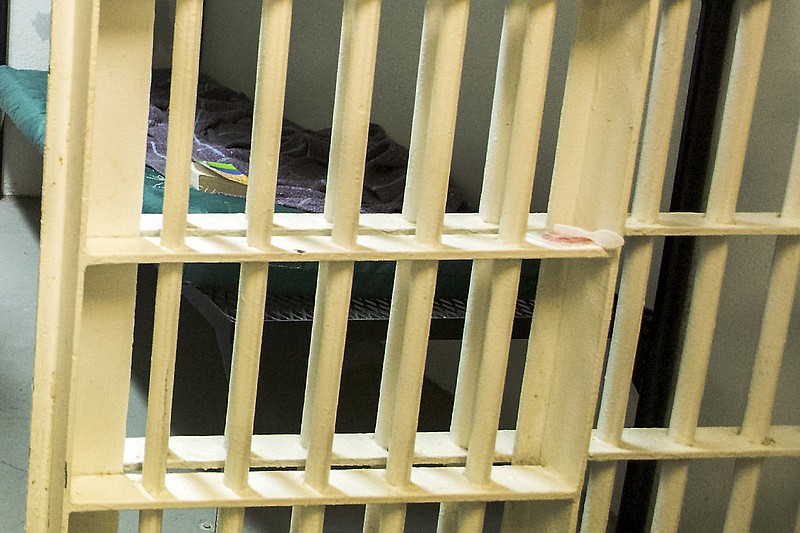A Pulaski County man arrested in September 2020 by Pulaski County sheriff's deputies who discovered a cache of firearms, including two machine guns, was sentenced Thursday to nine years in prison for the offense.
Gary Wayne Jones, 43, of Little Rock, pleaded guilty last August before U.S. District Judge Brian Miller to one count of being a felon in possession of a firearm in exchange for federal prosecutors' agreement to dismiss a count of machine-gun possession against him. Jones, who has 12 prior felony convictions on his record for drug and theft offenses dating back to 2000, was arrested following a traffic stop in North Little Rock after investigators conducting surveillance at another man's residence saw a man wheel a large plastic case resembling a gun case to a white sedan and depart the residence with another man.
Deputies found a number of firearms stashed inside the plastic case and several rounds of various ammunition inside a bag, according to court records. The records indicated that the passenger of the vehicle, identified as Jones, told deputies he had just bought the guns for $100 from an individual named "Donnie" who he said lived just up the road. The indictment against him listed nine firearms, including two machine guns; a Ruger Model AC-556 .223 caliber and an SWD M11 9mm, as well as four other rifles and three handguns in various calibers.
Jones' attorney, Dominique King of Little Rock, argued for a below guideline sentence of 75 months for Jones, arguing that despite his lengthy criminal history, none of his convictions were for violent crimes and that all were the result of a lifelong drug addiction.
Under U.S. sentencing guidelines, Jones' recommended sentencing range was 92 to 115 months in prison. The statutory maximum for the offense is 10 years in prison. Jones' criminal history score under the guidelines was calculated at 28, placing him in Criminal History Category VI, the top of the range.
"This is an example of a case where the guideline ranges don't work to appropriately account for the defendant's conduct and his history," King said. "Without the reduction for acceptance of responsibility ... his guideline range would obviously sentence him outside the maximum allowed by law."
King said Jones had no history of "using firearms, of shooting firearms or being violent in any way." King also asked Miller to give Jones credit for 28 months he had spent in jail awaiting resolution of his case.
"All of that time has been state time so he won't automatically get credit for that," she said.
King noted that at the time of his arrest, Jones was on parole and was sentenced to serve 90 days for the violation, but the remainder of the time he spent in jail was due to a hold by the U.S. Marshals Service.
Assistant U.S. Attorney Chris Givens argued against leniency for Jones and pointed out that the maximum penalty for possession of a firearm is 10 years.
"In this case, Mr. Jones was not convicted of possessing a firearm, he had 13 firearms," Givens said. "He had firearms that included machine guns ... that included magazines and illegal suppressors."
Givens conceded that Jones' criminal history didn't include violence "but it was certainly extensive."
"He has 28 criminal history points," he said. "That's more than twice the number for the top end of Category VI ... I don't know what he was going to do with these firearms but I do know they are extremely dangerous firearms, extremely illegal firearms even if he wasn't a felon to possess, and he was a felon 12 or 13 times over when he had these guns."
Givens said the only reason he wasn't seeking the statutory maximum sentence for Jones was due to his cooperation at the time of his arrest and his acceptance of responsibility for the offense, but he said Jones' criminal history was a big concern.
"Somebody who has 28 criminal history points and commits new crimes, including crimes like this," he said, "they're not going to stop committing crimes unless they're in prison."
"All that's true," Jones said when given the chance to speak. "I do have an extensive history of drug use. I started at a very young age shooting methamphetamine."
At that, Jones, overcome with emotion, stopped for several long moments as he struggled to regain his composure.
"I got high when I was 11 years old and I haven't stopped since then," he continued, his voice unsteady. "That's 30 years of treating my family bad, stealing from them to get drugs."
Jones then began reading from a prepared statement expressing remorse and a desire to break from drugs.
"I can't change my past but I can absolutely change my future," he concluded. "My future is hopeful and promising. It just took me hitting rock bottom to do it."
"This is a 10-year case given the history ... and given the fact that you had a large number of firearms," Miller said, all of which he said was compounded by the fact Jones was on parole at the time of his arrest.
Looking frustrated, Miller sighed and said his initial inclination was to vary upward to a 10-year sentence but on reflection, given Jones' 28 months in custody he decided to go to the middle of the guidelines at 108 months and to give Jones credit for time served.
"You want to make an objection to that?" he asked Givens.
"I don't have an objection if he was in custody only on this," Givens replied.
"That will be seven years you still have to do," Miller said to Jones.
In addition, Miller ordered Jones to serve three years on supervised release after he leaves prison.
